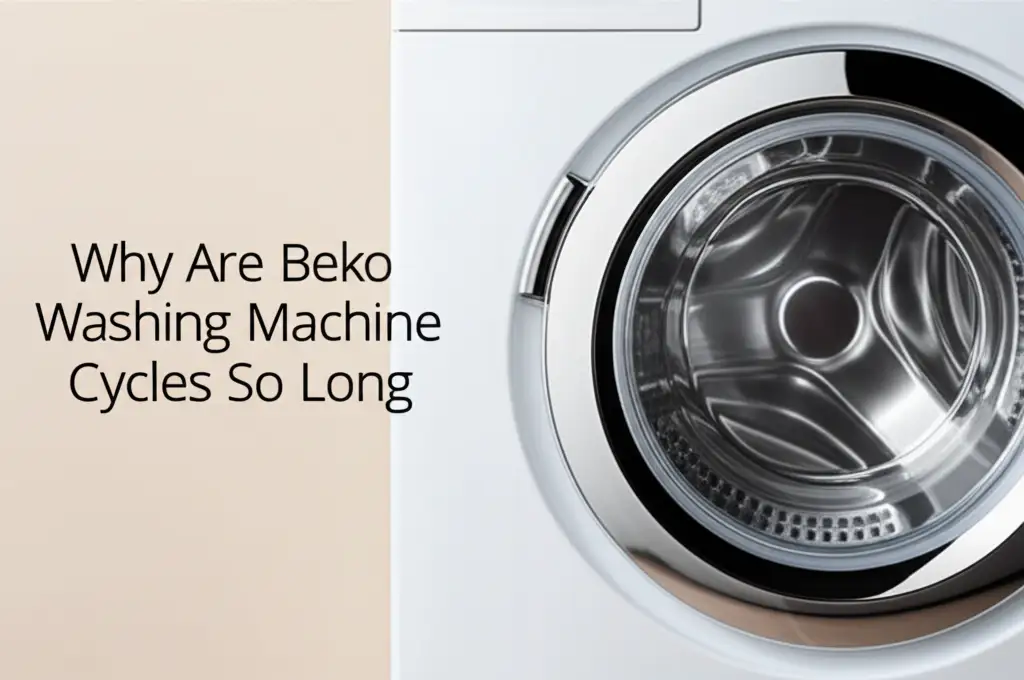· Kianna Connelly · Home Appliances · 11 min read
Why Does My Beko Washing Machine Keep Adding Time

Why Does My Beko Washing Machine Keep Adding Time
It can be frustrating when your Beko washing machine keeps adding time to its cycle. You put in a load, expect it to finish at a certain hour, and then watch the display count up instead of down. This common issue often signals that your machine is working harder to compensate for an underlying problem. Understanding these issues helps you fix them quickly. We will explore the common reasons your Beko washing machine extends its wash time and provide clear steps to troubleshoot these problems. This guide aims to help you get your laundry back on schedule.
Takeaway
- Check Load Size: Do not overload your Beko washing machine. Overloading leads to imbalance and extended cycles.
- Inspect Drainage System: Clear blockages in the pump filter or drain hose. Poor drainage causes the machine to add rinse or spin time.
- Verify Water Supply: Ensure good water pressure and clear inlet hoses. Inadequate water flow slows down the wash process.
- Use Correct Detergent: Avoid too much detergent. Excess suds trigger extra rinse cycles, prolonging wash time.
- Clean the Machine: Run maintenance washes. Dirt or limescale buildup affects sensor performance.
Your Beko washing machine keeps adding time because it detects an issue that prevents it from completing a cycle correctly. This usually relates to load imbalance, drainage problems, water supply issues, or excessive suds. The machine adds time to resolve these problems, ensuring clothes wash properly.
Understanding Your Beko Washing Machine’s Smart Behavior
Modern Beko washing machines are not simple timers. They have internal sensors and smart programs. These systems detect various conditions during a wash cycle. For example, your machine can sense the load’s weight and balance. It also checks water levels, temperature, and suds.
When a sensor detects something is wrong, the machine adjusts. It might add water or try an extra spin. This adjustment aims to correct the issue and ensure a good wash. If your Beko washing machine keeps adding time, it is usually performing these self-corrections. It tries to finish the job well, even if it takes longer. This feature often prevents bigger problems later.
Common Causes for Extended Cycles: Load Imbalance and Overloading
One of the most frequent reasons your Beko washing machine keeps adding time is an unbalanced load or too much laundry. When you put too many clothes in the drum, or if heavy items clump together, the machine cannot balance the load properly during the spin cycle. This creates vibrations. The machine senses these vibrations.
To fix this, the machine will often stop spinning. It then tries to redistribute the clothes by tumbling them slowly. If it cannot balance the load, it might add more water to try again. This process can repeat several times. Each attempt adds more minutes to the cycle. Always ensure you load your Beko washing machine correctly. Avoid stuffing the drum too full. Distribute items evenly.
Drainage Issues and Their Impact on Cycle Length
Poor drainage is a significant reason your Beko washing machine keeps adding time. If water cannot drain properly, the machine cannot move to the next part of the cycle, like spinning. This causes delays. Your washing machine might add time while it waits for water to clear.
Several things can cause drainage problems. A clogged pump filter is a common culprit. This filter catches lint and small objects. If it gets blocked, water flow slows down. A kinked or blocked drain hose also stops water from leaving. Check these parts regularly. I find that a quick check of the drain hose often solves many time-adding problems. A faulty drain pump can also be the reason. If your Beko washing machine is not spinning or draining, it will certainly add time. This is a crucial step to examine. You can find more information about this issue here: Why Is My Beko Washing Machine Not Spinning or Draining.
- Check the Drain Filter: This filter is usually at the bottom front of the machine. Open the small access panel and twist the cap. Clean any debris you find.
- Inspect the Drain Hose: Make sure the hose is not kinked or squashed behind the machine. Also, check inside the hose for blockages.
- Listen to the Drain Pump: A failing pump might make unusual noises or no noise at all when it should be draining.
Water Supply Problems and Pressure Sensors
Inadequate water supply can also make your Beko washing machine keep adding time. The machine needs enough water to fill the drum and rinse clothes. If the water pressure is too low, filling takes longer. The machine’s pressure sensor detects the water level. If it does not reach the correct level in a set time, the machine will wait. This waiting period adds minutes to your cycle.
Check your home’s water pressure. Ensure the water taps connected to the washing machine are fully open. Also, inspect the inlet hoses at the back of the machine. The small filters inside these hoses can become clogged with sediment. You can remove the hoses and clean these filters. This ensures water flows freely into your appliance. Proper water flow is vital for efficient cycles.
Detergent Dosage and Suds Detection
Using too much detergent is a very common cause of extended wash times. Modern Beko washing machines have suds detection systems. These systems monitor the amount of foam inside the drum. If there are too many suds, the machine knows it needs to rinse more.
Excess suds can prevent clothes from rinsing properly. They can also interfere with the spin cycle. To combat this, your Beko washing machine will add extra rinse cycles. Each extra rinse takes more time. This is a protective measure to ensure your clothes come out clean and without detergent residue. Always follow the detergent manufacturer’s recommendations. Use less detergent for softer water or smaller loads. If your machine is not taking fabric conditioner, it might be related to other dispenser issues, which could also affect how detergent is used. This can cause problems with residue and potentially contribute to time extensions. You can learn more about related dispenser problems here: Why is my Beko washing machine not taking the fabric conditioner.
Heating Element Faults and Temperature Regulation
The heating element in your Beko washing machine warms the water to the selected temperature. If this element is faulty or covered in limescale, it will take much longer to heat the water. Some wash cycles require specific water temperatures for effective cleaning. If the water does not reach the target temperature within a set timeframe, the machine will pause. It will continue to try and heat the water.
This waiting game adds significant time to the overall cycle. You might notice your clothes are not as clean, especially with stains that need hot water. A visible sign could be an error code related to heating. Limescale buildup is common in hard water areas. Regular maintenance washes with a descaler can help prevent this. If your machine takes too long to heat water, the heating element might need replacement.
Control Board or Software Glitches
Sometimes, the issue is not mechanical. It can be electrical. The control board is the brain of your Beko washing machine. It manages all functions and sensors. A glitch in the control board or its software can cause the machine to miscalculate cycle times. It might receive incorrect signals from sensors. This can lead to random time additions.
A simple power reset can often fix minor software glitches. You can unplug the machine for a few minutes. Then plug it back in. This is like rebooting a computer. If the problem persists, it could indicate a more serious control board issue. Replacing a control board is complex and often requires a professional technician. If your Beko washing machine is not turning on at all, it might point to a bigger electrical issue, potentially with the control board. You can find more information about starting issues here: Why Is My Beko Washing Machine Not Turning On.
Troubleshooting Steps You Can Take
When your Beko washing machine keeps adding time, there are several steps you can take yourself. These actions help you identify and fix common problems. I always start with the simplest checks first. It saves time and money.
- Reduce Load Size: Try running a smaller load. Ensure clothes are distributed evenly in the drum. This prevents imbalance issues.
- Check Drain Filter and Hose: Regularly clean the drain pump filter. Look for kinks or blockages in the drain hose.
- Inspect Water Inlet Hoses: Ensure water taps are fully open. Clean the small filters where the hoses connect to the machine.
- Use Less Detergent: Adjust your detergent dosage. This prevents excessive suds, which trigger extra rinse cycles.
- Run a Maintenance Wash: Use a washing machine cleaner or hot water with white vinegar. This helps remove detergent buildup and limescale.
- Perform a Power Reset: Unplug the machine from the wall outlet for 5-10 minutes. Then plug it back in. This can reset the control board.
- Check for Error Codes: Your machine display might show an error code. Look up the code in your Beko user manual. This code points to specific faults.
These steps often resolve common issues causing cycle extensions. Taking the time to do these checks can prevent unnecessary service calls.
When to Call a Professional
While many issues can be fixed yourself, some problems require expert help. Knowing when to call a professional saves you from causing more damage. If you have tried all the troubleshooting steps and your Beko washing machine keeps adding time, it might be time for a technician.
- Persistent Error Codes: If your machine displays error codes that do not clear after a reset, a component might be faulty.
- Unusual Noises or Smells: Grinding sounds, burning smells, or continuous humming can indicate motor or pump problems.
- Water Not Heating: If the heating element is suspect and you are not comfortable replacing it, a professional can test and replace it safely.
- Control Board Failure: Diagnosing and replacing a faulty control board is complex. It requires specific tools and knowledge.
- Leaking Issues: If your machine leaks from the soap dispenser or other areas, it needs attention. Addressing leaks promptly prevents further damage. You can read more about leaks from the soap dispenser here: Why Does My Beko Washing Machine Leak From The Soap Dispenser.
- Safety Concerns: Always prioritize safety. If you feel unsure about any repair, call a qualified appliance technician. They have the experience to diagnose and fix the problem safely and effectively.
FAQ Section
Why does my Beko washing machine take so long to wash? Your Beko washing machine might take longer due to several reasons. These include an unbalanced load, drainage issues, or problems with water pressure. Excessive suds from too much detergent also trigger extra rinse cycles. The machine extends time to correct these issues, ensuring a proper wash and rinse.
Can overloading cause my Beko washing machine to add time? Yes, overloading is a common cause. When the drum is too full, the machine struggles to balance the load during spinning. It then adds water and tumbles clothes repeatedly to redistribute them. Each attempt adds minutes to the cycle, making the wash take much longer.
How do I reset my Beko washing machine to fix timing issues? To reset your Beko washing machine, first unplug it from the power outlet. Wait for about 5 to 10 minutes. Then, plug the machine back in. This power cycle can clear minor electronic glitches and often resolve software-related timing problems.
Does low water pressure affect wash cycle duration? Low water pressure certainly affects cycle duration. If the machine cannot fill with water quickly enough, its sensors detect the delay. The machine will wait for the correct water level before proceeding. This waiting time directly adds to the overall wash cycle length.
Why does my Beko washing machine have extra rinse cycles? Your Beko washing machine adds extra rinse cycles, mostly due to too much detergent. The machine’s suds detection system identifies excess foam. It then performs additional rinses to remove the suds. This ensures clothes come out clean and without residue, but it also extends the cycle time significantly.
Is it normal for a washing machine to adjust cycle time? Yes, modern washing machines, including Beko, often adjust cycle time automatically. They use sensors to detect factors like load size, water temperature, and suds levels. If conditions are not ideal, the machine extends the cycle to achieve the best washing results. This is a smart feature, not always a fault.
Conclusion
When your Beko washing machine keeps adding time, it usually points to an underlying issue that the machine is trying to compensate for. We have covered the common culprits, from unbalanced loads and drainage problems to water supply issues and excessive detergent use. Understanding these causes helps you troubleshoot effectively. Many of these problems have simple solutions you can perform at home.
I encourage you to start with the basic checks: review your load size, inspect filters and hoses, and adjust detergent use. These steps often resolve the problem quickly. Remember, your Beko washing machine’s ability to extend cycles is a smart feature. It works to ensure your clothes get a thorough clean. If you have tried these fixes and the issue persists, do not hesitate to contact a qualified technician. A professional can diagnose complex problems safely. By taking action, you can get your laundry routine back on track, making sure your Beko washing machine works efficiently for years to come.
- Beko washing machine
- washing machine problems
- appliance repair
- laundry tips
- cycle time issues





